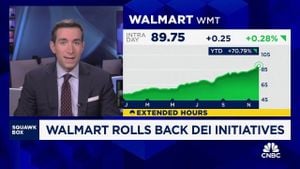Huawei Technologies recently introduced its highly anticipated Mate 70 smartphone series alongside its new operating system, HarmonyOS NEXT. This launch marks both a pivotal step for Huawei as it attempts to reclaim its footing amid significant challenges posed by U.S. sanctions and competition from Western tech giants.
The Mate 70 lineup, which includes the Mate 70, Mate 70 Pro, and Mate 70 Pro+, promises to revolutionize the smartphone experience with advanced features, including support for satellite paging, improved processing capabilities, and enhanced camera technology. The starting price for the Mate 70 is set at 5,499 yuan (around $759), with the Pro version beginning at 6,499 yuan.
Richard Yu, head of Huawei's Consumer Business Group, highlighted at the launch event, "Today, the long-awaited Mate 70, the most powerful one ever, is here." This optimistic declaration reflects Huawei’s tenacity to advance its interests, particularly following the setbacks from U.S. export restrictions on its semiconductor supply chains.
The introduction of HarmonyOS NEXT is particularly noteworthy, representing the company's commitment to distancing itself from foreign technologies such as Android. Unlike previous versions, HarmonyOS NEXT requires software developers to completely rework their applications to be compatible with its ecosystem, which presents both challenges and opportunities for developers.
Gary Ng, a senior economist at Natixis, commented, "HarmonyOS NEXT is the first home-grown operating system, a milestone for China to move away from reliance on Western technologies for software with performance improvement." This underlines Huawei's strategic approach to not only regain market share but also to instill national pride associated with technological independence.
Despite the optimism surrounding the Mate 70 series, Huawei's market comeback is tempered by uncertainty. Although reports suggest over three million units have been pre-ordered, such numbers do not guarantee sales, as pre-orders often lack the commitment of confirmed purchases. The sales will officially begin shortly after the event.
The global smartphone market has changed dramatically over the past few years, especially following the U.S.-China tech war. Huawei, once China’s leading smartphone maker, has faced severe challenges from these geopolitical tensions, especially U.S. sanctions which have severely impacted their access to high-end technology and components.
According to recent data, Huawei managed to regain some traction within the Chinese market, selling around 10.8 million smartphones within the third quarter. This success has not gone unnoticed, as it captures approximately 16% of the local market share, clearly illustrating their strategic maneuvering post-sanctions.
At the forefront of Huawei's strategy is the need for self-reliance, especially as it relates to semiconductors. The Mate 70 series' processors are largely produced within China, following previous edge cases where foreign-made components were found to have been improperly supplied.
During the launch, there was little mention of specifics on the chip technology used within the Mate 70 devices. Industry experts speculate this is likely due to the sensitive nature surrounding their supply chains, especially with the looming threats of stricter U.S. regulations on any company involved with Huawei.
Despite these concerns, the Mate 70 series' specs suggest substantial advances. The devices are rumored to support faster charging, enhanced AI-driven photography capabilities, and other features to stake their claim alongside top competitors like Apple and Samsung.
Yu asserted, "We expect application development and updates will rapidly advance over the next few months, achieving maturity and user satisfaction." This assertion underlines Huawei’s optimism but also the hurdles the company must navigate to build its ecosystem successfully.
Indeed, the road to rolling out HarmonyOS NEXT is littered with challenges. Developers have expressed skepticism about committing resources to alter existing applications for the new platform, with costs for such adjustments dramatically inflated. One external estimate suggested it could run as high as 2 million yuan (approximately $370,000) just to adapt apps for HarmonyOS.
Prospects for Huawei rely on overcoming these developer hesitations. Tech analysts point out the importance of showcasing continuous improvements, increasing support, and proving long-term loyalty to developers to forge necessary partnerships. “Convincing third-party developers to embrace the Harmony ecosystem is one of Huawei's most pressing tasks,” stated Paul Triolo, partner at consulting firm Albright Stonebridge Group.
The Chinese tech giant's path forward may also require not only showcasing advanced tech but also tapping deeply-rooted national pride among consumers eager to support domestic products over foreign alternatives.
The stakes for Huawei couldn't be higher. With HarmonyOS NEXT, the company is pushing forward with its vision of autonomy from Western technological reliance and cementing its place within the rapidly shifting smartphone ecosystem.
Though Huawei's Mate 70 launch emphasizes problematic areas, such as access to chips and the overall success of HarmonyOS, it also symbolizes resilience against adversity. The sharp rise of this smartphone manufacturer’s ambitions reflects broader themes of national pride, technological innovation, and the complicated interplay between global trade and local aspirations.
Looking forward, it will be captivating to see how these devices perform commercially against Apple's and Google's entrenched positions. If Huawei's innovations resonate with consumers and app developers alike, they might very well be on the path to reclaiming their spot as leaders within the technology market.



